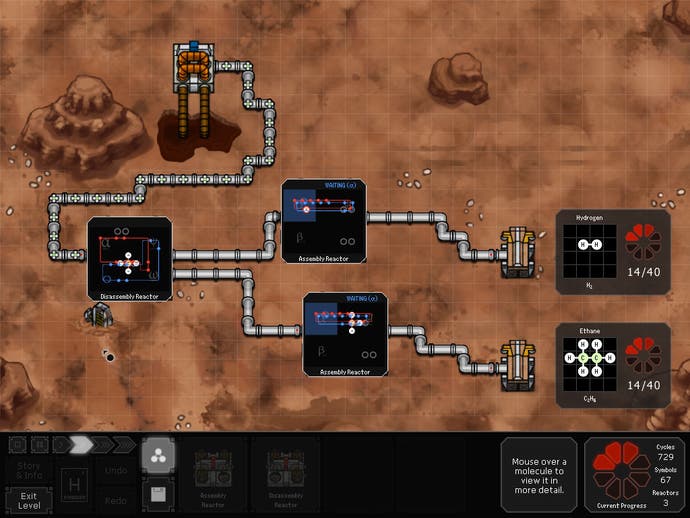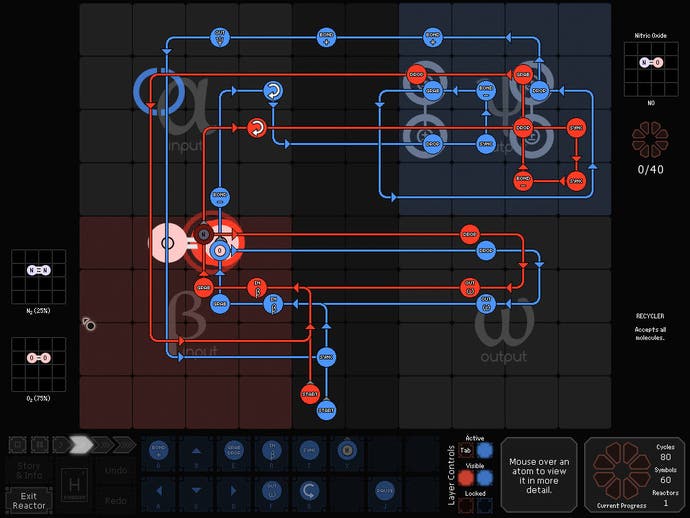SpaceChem
Up and atom.
And so a gratifying cycle of trial, error and discovery commences. Before long, a twisting network of waldo trails takes shape on the screen, with bright instruction nodes scattered around like glittering traffic lights.
The intermediate steps of constructing a reactor are so engrossing that the final pay-off comes as a surprise. You turn the contraption on, the waldos do their dance – hey, you're making methane. The game gives you a few seconds to watch the process and, yes, grab some spectators if you're so inclined.
Then you can move on to the next challenge. Or not. That's a central tension throughout SpaceChem; the drive to proceed into new stages competes with the allure of revisiting past levels to tinker. SpaceChem stokes the latter temptation by presenting an efficiency report at the end of a level. This pernicious document grades your solution by metrics, like the time it took your machine to process the materials and how many instructions you had to place in the waldos' code to do it.
The report card is a tease, as it charts the elegance of your solution against the results of other people who have played the game. You rearranged those helium atoms using 16 instructions, bully for you. But look here, a couple of guys figured out how to do the same job with only 12. Now that's something! If only you could be more like them.

Thus the urge arises to dive back into the reactor grid and push your results closer to the left edge of the bell curve. Once you've trimmed your codebase and shaved cycles off your runtime until your design can't possibly get any cleaner, you get to look at the revised efficiency report and bask in the fact that everyone in the world is stupider than you, except for that little sliver of people on the edge of the chart there, but they probably cheated or something.
SpaceChem's story is a passable tale of sci-fi intrigue. You're the rosy-cheeked recruit who joins up with a shadowy outer-space engineering concern. The place has its standard share of crazy galactic happenings: A bunch of workers get blasted out of an airlock, gas explosions destroy a berserk robot, some employees fall ill with debilitating brain disease. Basically, a meal at Taco Bell, but in space.
The story is mostly there for ambience, and SpaceChem is very good at ambience. Its soundtrack has a grand tone, with bit of eeriness, all of it quite listenable. Small, considered visual touches, like the flashing lights of a reactor grid in action and the chemical formulas on the periphery on the interface, complete the sensation that you're doing something cutting-edge, even dangerous.

Scientists recently rejiggered a helium atom to behave like hydrogen. I have only a basic understanding of how that works, but damn if it doesn't sound pretty cool. It makes me wonder if the experience of building an elaborate atomic reactor in SpaceChem is a taste of what it was like to conduct that experiment.
Sure, SpaceChem is just pseudo-science, but it does capture that mystique of toying with nature's fundamental ingredients. And while nuclear chemists are serious professionals, I'm willing to bet that the first time that one of them transformed a smidgen of helium into super-heavy hydrogen, part of him wanted to cry, "Look what I made!"
SpaceChem is available now as a direct download from www.spacechemthegame.com for PC, Mac and Linux. Thanks to Quintin Smith for the tip.








